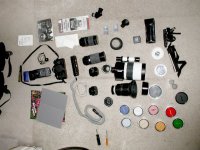Lots of good advice has been given. The lower end Nikons and Canons are very similar, and what feels better in you hand, and control lay out preference is important.
Personaly, I am a fairly serious Nikon shooter. I enjoy using my older Nikon digitals, like the D2Xs, but in digital cameras, like computers, newer is better. Digital sensor performance and auto focus has improved by leaps and bounds in recent years, and a new Nikon D3100, a consumer camera, will offer more resolution and better low light performance than my D2Xs, a camera that was a top of the line, $5000 pro camera just 8 years ago. Matter of fact, the newer D3200 might be an even better choice. Newer, better sensor. Better movie mode.
When you buy one (Nikon), they are available in kits, with lenses included. The 18-55 and 55-200 are popular kit lenses, and are very nice for the money. The 55-200 is available with VR (vibration reduction), and is worth spending the few extra bucks for, as it enables you to hand hold the camera and clear pictures in lower light with telephoto lenses. Another thought, if $$ is a consideration, is to also look for a clean, used, AFS Nikon 50mm f1.8 lens. It will allow a lot more light into the camera, hence higher shutter speeds, and provide good performance for things like kids, who don't like to sit still.
Another nice thing with Nikon Is you can find older, manual focus Nikon lenses that will work great on your camera, for not a lot of money. Canon changed the lens mount on its cameras when they went to auto focus, making their FD manual focus lenses un-useable on their newer AF bodies.
Both makers have had good and bad reports of service, though I believe as in anything, it is exaggerated on the internet. With Nikon, I would advice buying a genuine Nikon USA import model, not "Grey market", thru an unauthorized importer, as Nikon USA repair will not stand behind them.
Larry







